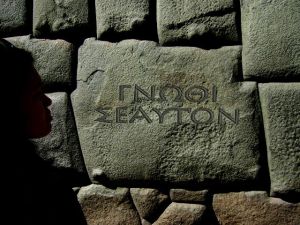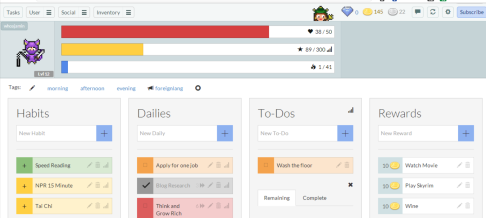Mindfulness, Creativity, and Productivity
Happy Friday! Another week has gone by, and this week I have focused my attention on one aphorism: “Know Thyself.” This Ancient Greek phrase has been quoted and used a million times over; however, the profound question persists today, who am I?
Take a look at old picture of yourself. A Zen Buddhist teacher would ask you “Who is that in the picture?” The knee jerk reaction is: “That’s me!” But the teacher goes back and says “How can it be you? You aren’t that age, you don’t look like that.” The common response now is that was me. But how could it not be you? The answer the teacher is looking for is “That was me, and it is me.” Zen Buddhist teachings rely heavily on riddles, such as what is the sound of a one-handed clap? The idea is to change your paradigm on what is and what isn’t: the Beginners Mind. The Beginner’s Mind concept is to be as open with things as possible, in the moment, mindfulness (or Zen). When we look back at the picture, our immediate reaction is to think in a particular way, to distinguish and characterize what we see, compartmentalizing our sense of self. The Zen method is to question yourself, or know thyself, knowing consciously that though that is where you have come from and is part of who you are, it isn’t who you are now; your mind has changed, your cells have died and new ones have taken your place.
This week I have been reading a practice book of sorts called “How to Train a Wild Elephant” by Jan Chozen Bays. http://www.amazon.com/How-Train-Wild-Elephant-Mindfulness/dp/1590308174
The purpose of the book is a series of little tasks or challenges to bring you into your conscious awareness. These tasks can be as simple as using only your left hand at certain tasks like brushing your teeth or eating with chopsticks. The object of these tasks are to be mindful and appreciative of the small things in life, rather than being lost in your mind.
Further to the concept of expanding your mind, I have to talk about Creativity. For me, Zen and creativity are symbiotically attached to one another. From my personal experience, writing comes from an inner voice; the words appear on paper when the writing comes from your soul. Elizabeth Gilbert, the author of New York Times bestselling “Eat, Pray, Love,” attributes this to an inner “Genius.” http://www.ted.com/talks/elizabeth_gilbert_on_genius On this Ted Talk, Elizabeth explains where the word “genius” comes from. It’s root is a Muse rather than something of genetic origin. As a writer, the concept of a Genius possessing me and giving me words to type is an appealing one, though I believe a more methodical approach is necessary. I suggest everyone to question any method or idea that I present, and I think Elizabeth’s approach has merit. However, I believe that in an attempt to shield the author from self criticism by appointing the “Genius” as the source of writing, the “Genius” creates barriers for writing. Procrastination is an ugly creature, and blame is major contributor to this. About to go for a run? Oh you can’t because your iPod isn’t charged. About to start writing? Oh I can’t because these floors are just too dirty. This type of thinking changes our attention from what is important by making procrastination easier to do. Even quieting the mind takes effort; we procrastinate on this Zen experience as well by filling the void with tasks. However, if we look at Elizabeth’s Genius as a process of writing, it is essential to clear our minds and attempt to let the ideas come organically. Various writers use all sorts of different conditions to generate this environment, but it is concentrated around certain events in order to achieve this state of mind. In the book “Daily Rituals: How Artists Work” by Mason Currey, http://www.amazon.com/Daily-Rituals-How-Artists-Work/dp/0307273601 he explores hundreds of artists’, writers’, and composers’ methodologies for achieving their results. This book a very interesting read, if even just to see the madness of some authors, from authors binge drinking or drug use to subjection of their thoughts and efforts to particular times and schedules. Regardless of your methodology, expanding your mind tends to take a very concerted effort even to get the organic results.
And speaking about results brings me to my last treasure of today, HabitRPG. http://www.Habitrpg.com is a website designed for you to create a program for you to develop and track your habits.
It may seem like a very silly concept: you have a 2d avatar of yourself which you develop by completing real-life tasks, and in exchange, you level up and gain gold. The gold you purchase on either your own rewards (gaming, wine, magnum chocolate, etc.), or you can buy in-game awards (new swords, shields, armor…) that help you defend against tasks you forget about or gain you more gold for completing tasks. As silly as this sounds, the game plays on human psychology (http://en.wikipedia.org/wiki/Stanford_marshmallow_experiment)
to help you excel at real-life tasks. By giving you immediate consequences for not completing tasks and immediate rewards for doing particular tasks, you get a sense of how you are performing in particular aspects or aspirations in your life. The software helps you track how well you are doing in order to hit the coveted day 28 mark (the assumed day when most people make a task into a habit). Although the game may be a bit silly, I have found it to be not only one of the most effective free services, but also one of the most detailed and measurable services available on mobile devices and the internet. If you are trying to develop new habits, I would look into this.
Going back to the initial aphorism, “Know Thyself,” I challenge you to try to expand your mind and measure your results. We often do this without consciously thinking about our actions and when we reflect Why did I do that? The answer is often I don’t know. I challenge you to rethink your own paradigms, attempt to be more mindful and conscious in your actions, and try something different to measure your results. As Albert Einstein said, “Insanity is doing the same things over and over again and expecting different results.” Hope to see you next Friday!

